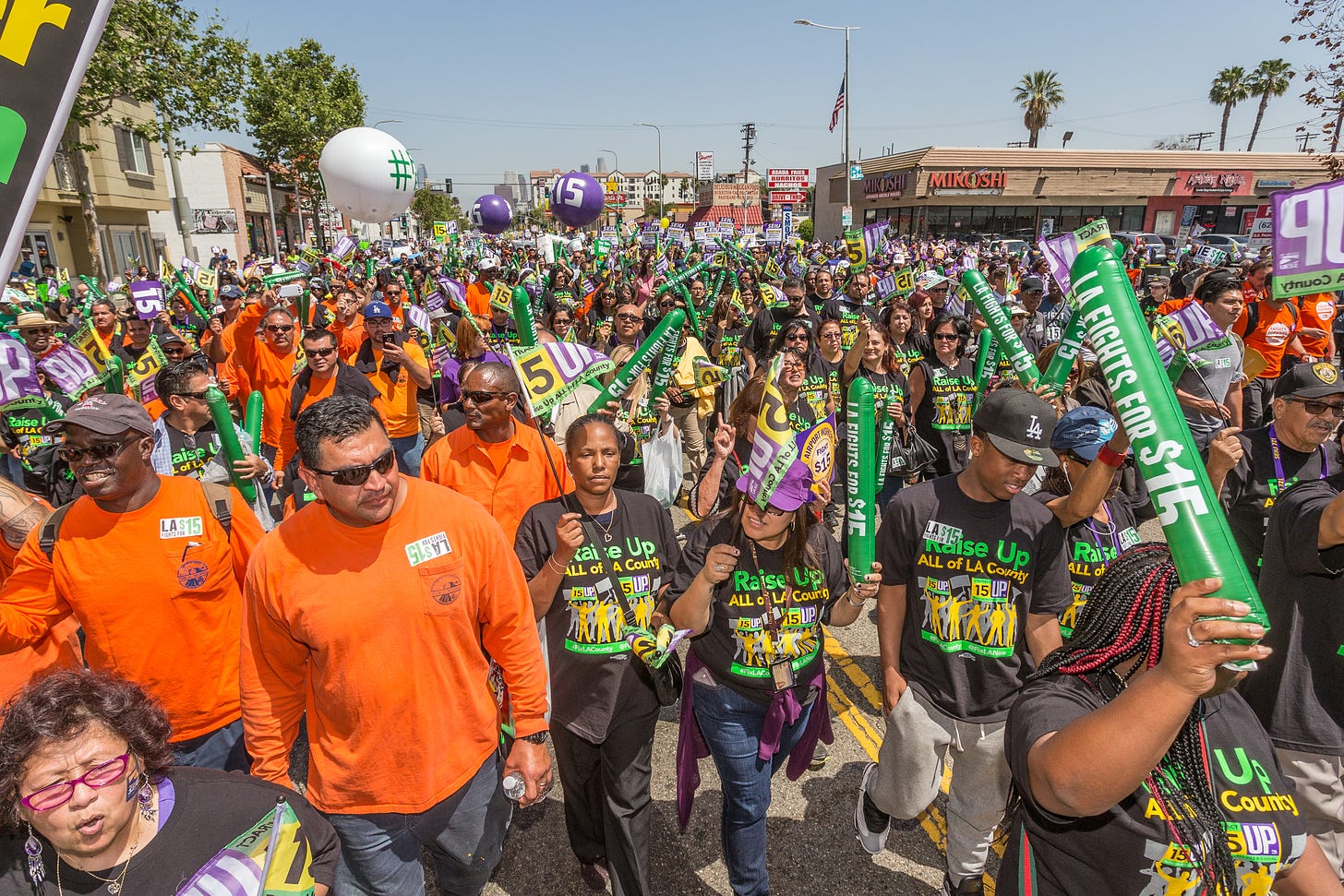Florida lawmakers may let companies slash wages for tens of thousands of workers across the state
Last-minute legislation would undo living wage laws that have been adopted in communities across Florida, including Miami, St. Petersburg and Gainesville.

This is Seeking Rents, a newsletter and podcast devoted to producing original journalism — and lifting up the journalism of others — that examines the many ways that businesses influence public policy across Florida, written by Jason Garcia. Seeking Rents is free to all. But please consider a voluntary paid subscription, if you can afford one, to help support our work.
Tens of thousands of poorly paid workers across Florida could have their wages cut by 30 percent or more, under last-minute legislation that surfaced this week in Tallahassee.
The far-reaching measure would undo “living wage” ordinances adopted in communities like Miami, St. Petersburg and Gainesville. These local laws require companies that get government contracts to pay their workers higher wages or better benefits.
It was slipped into an unrelated bill — a bill dealing with pay for minor league baseball players — during a committee hearing Monday in the state House of Representatives, where members of the public were given less than 30 seconds each to speak.
Rev. Dr. Russell Meyer, a pastor at a Jacksonville church and the head of the Florida Council of Churches, warned members of the House Commerce Committee that undoing local living wages would end up forcing churches and other charities to pick up the slack, because so many low-wage workers simply cannot make ends meet in an increasingly expensive state.
“This is a charity tax,” Meyer said — just before he was cut off from saying any more by Rep. Bob Rommel (R-Naples), the chairperson of the Commerce Committee.
The legislation would forbid any city or county in Florida from using its purchasing or contracting procedures to make contractors pay their workers more than the state minimum wage or provide benefits beyond the bare minimum required under state law.
Rommel was crystal clear about the intent. It is, he said, “to make sure local governments don’t try to have a higher minimum wage than the minimum required by the state.”
This would likely mean substantial pay cuts for workers in places like airports, convention centers and city halls, and for folks who do everything from laboring on construction sites to mowing the grass in public parks.
For instance, Alachua County makes many contractors pay their workers the equivalent of at least $18 an hour. Broward County requires at least $18.65 an hour. And Miami-Dade County insists on at least $18.73 an hour.
The state minimum wage is just $11 an hour, although it will slowly rise each year until it reaches $15 an hour in September 2026.
This bill would strip living wage protections from an estimated 16,250 working families just in Miami-Dade County, according to Jess McCarty, a lobbyist for the county.
The proposal is very similar to a bill sponsored last year by a disgraced former legislator who recently pled guilty to Covid-19 relief fraud. The Tampa Bay Times reported that last year’s bill was pushed by Power Design Inc., a St. Petersburg-based mechanical, electrical and plumbing engineering contractor that won more than $1 billion in new contracts last year alone — and that once paid $2.75 million to settle claims that it illegally underpaid its workers.
It’s not clear if Power Design is lobbying for this year’s version of the bill. Representatives for the company did not respond to requests for comment.
But Power Design has been a significant campaign contributor in recent months. Since the fall, records show Power Design has given $70,000 to a political committee controlled by its lobbyists, which has in turn been donating to individual lawmakers. The company has also given another $60,000 to Gov. Ron DeSantis, who would have to sign the legislation into law.
And while last year’s bill failed, this year’s seems likely to get much further — through the Florida House of Representatives, at least. House Speaker Paul Renner (R-Palm Coast) told reporters Wednesday that he supports it.
“I don’t think we should have different wage ordinances throughout the state,” Renner said.
The effort to undo local living wage laws is part of a broader assault on worker’s rights happening in Tallahassee this session.
Lawmakers are poised to pass legislation soon that is meant to undermine the labor unions that represent most public-sector workers — including teachers, nurses, 911 dispatchers, garbage haulers, electric utility workers and many others.
Another bill would weaken job protections for university faculty. A third would strip workers at spaceflight companies like Blue Origin and SpaceX of some of their rights to sue following a bad accident — even if the accident was caused by the company’s negligence.
And the underlying bill to which the anti-living wage measure was amended comes from lobbyists for Major League Baseball, which wants the Legislature to cut minor league baseball players off from minimum-wage protections.
Correction: An earlier version of this story misstated the name of the Rev. Dr. Russell Meyer.





And this is helping Citizens HOW?
Where are the people screaming in the streets??? We have become so complacent we just accept what's happening. Sickening.
Since I am having health problems, I have not been active in protests or campaigns in quite some time. However, the cities mentioned in the article may have named some groups that organized the rather large protests in the pictures. The Florida Democratic Party did not respond when I offered to help make phone calls or write postcards, etc. during the midterms. But they have new leadership, so hopefully that has changed. That's the best I can do for now.